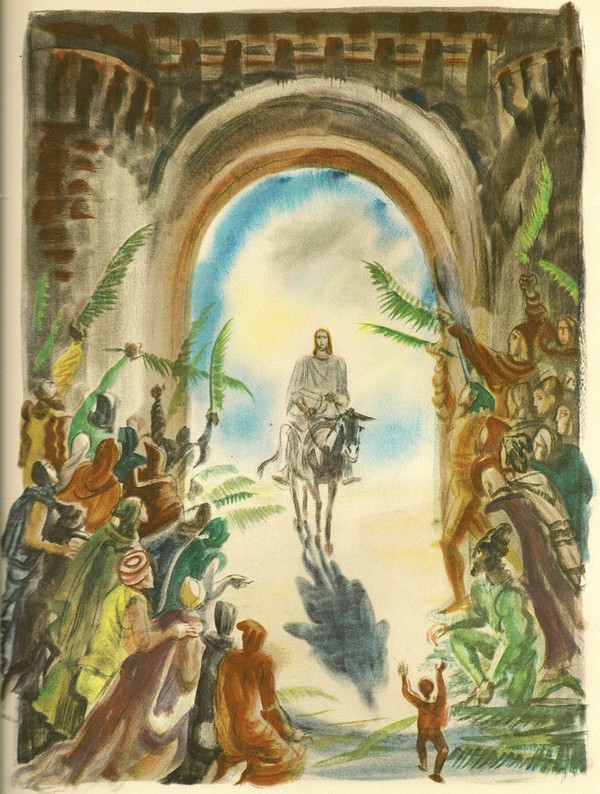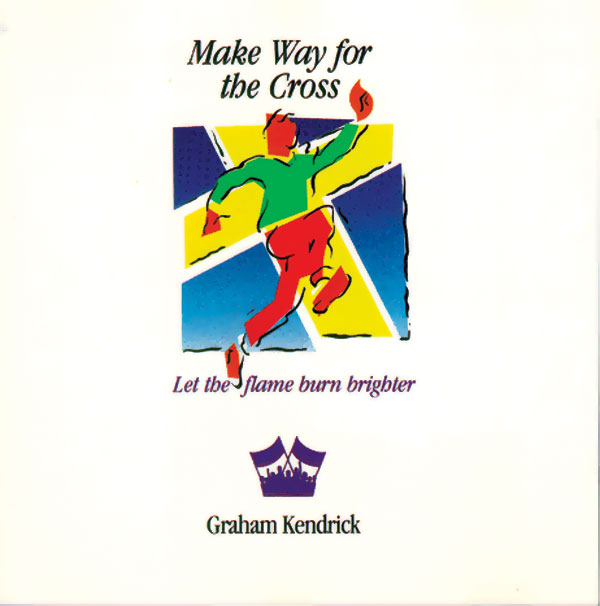A Bible reflection for Palm Sunday (5 April 2020)
By Stephen Craven, Reader (Licensed Lay Minister) in the parish of Bramley, Leeds.
Introduction
Since all churches including ours (St Margaret’s Bramley) are closed at present, there will an online service offered by the Rector at 10.15 this morning on our Facebook page. If we had been having a service in church it would have been my turn to preach, so here is my reflection on the set readings for the day.
The Anglican liturgy for Palm Sunday is different from the standard pattern. Instead of the usual short Bible readings, there are no fewer than six readings set for today, the last and longest of which is the full story of the passion (suffering) of Jesus according to Matthew. I have chosen to comment on four of these.
Practical tip: for the Bible readings, right-click and select ‘open in new tab’ so that you don’t lose your place on this page.
The first Bible reading
Matthew 21:1-11 Jesus enters Jerusalem
Reflection
At a time when we are all socially isolated, reading of the crowds pressing around Jesus seems strange, and their cheerful shouts of praise may sound discordant or even disrespectful when we know how many people are suffering. We are beginning to get used to being on our own, or just with a few family members, most of the time.
Yet people are still finding ways of doing things together, of staying positive. Online meetings, virtual parties, swapping jokes (did you see the announcement on 1 April that the Bishop of London will be blasted into space to found the Diocese of the Moon and Mars?). ‘Dates’ where we chat by phone over our individual cups of coffee or glasses of wine.
And then there’s the 8pm clapping for the NHS – coming together to honour the workers putting their own lives at risk, hailed as heroes and heroines by the rest of society. That’s much like what the crown on Palm Sunday were doing, coming together to honour Jesus as their hero, the one who would save them (Hosanna means ‘save us!’). But save them from what? From the Romans? From Herod? A very different answer would emerge in the course of the next week.
The second Bible reading
Psalm 31:9-16
Reflection
Many of the Psalms are songs of lament, an honest crying out to God of the things that are wrong in our lives or in society, and the pains we suffer (physically or mentally). Several of the verses of this psalm have echoes of how people are suffering with the Coronavirus: “Have mercy on me, Lord, for I am in trouble”… “my strength fails me because of my affliction, and my bones are consumed” … “when my neighbours see me in the street they flee from me. I am forgotten like one that is dead, out of mind” … “fear is on every side”. Nothing can shock God, so in reading this psalm and responding to it, be honest with him about how you are feeling.
But like many of these psalms of lament, Psalm 31 ends in hope. “Blessed be the Lord, for he has wondrously shown his love to me when I was beset as a city under siege … be strong, and let your heart take courage, all you who wait for the Lord.” (verses 21, 24).
The third Bible reading
Philippians 2:5-11
Reflection
In the early centuries of Christianity, men argued constantly about who Jesus actually was – truly God and not fully man, or truly man and not fully God, or somehow both fully God and man? Most branches of Christianity teach the last of these: Jesus was truly divine, yet in every way a real human being: body, mind and spirit. When he suffered, he really suffered. Did this – becoming a suffering soul in a suffering body, dying on the cross – demean him, somehow compromise his pure divine nature?
Paul, writing to the Christians at Philippi, gives a resounding ‘no’ as his answer. Precisely because Christ suffered for us as the man Jesus, experiencing all the pain that we can experience (while at the same time demonstrating how we should live), and thereby redeeming us from the sin that had separated us from God, he was given the highest honours in Heaven, and deserves the highest praise from us. Part of the way that we can honour Jesus’ sacrifice for us is by being servants of others, as many are doing already at this time of suffering.
The fourth Bible reading (the Passion Gospel)
Matthew 26:14-27:54
Reflection
What does Holy Week have in common with the present lockdown of society? For a start, the rapidly changing events. No two days are alike. Three weeks ago, I was working as normal in a city centre office, drinking with friends in pubs in the evening. Then came word that we should be socialising less, keeping our distance from people. The Diocese (my employer) asked us to work from home at least three days a week. That was new for me, setting up my work laptop to log in to the office computer network. By the end of the week, we were told to take home whatever we needed as the office would be closing and home working has become semi-permanent. I’ve had to learn video conferencing, scanning papers at home to upload remotely to the office.
The following weekend, like many people, Linda and I met friends for the final time in a pub on Friday evening, and on Saturday we drove out into the countryside – parking on a minor road, walking (mostly) quiet paths. Two days later the Government told us even that was not permitted, and we’re now only allowed a short daily walk from home. Phone calls (maybe with video) are the only way of keeping in touch, and for those who live alone and don’t have the internet, it’s even worse (my mother is at least seeing my sister who comes to sit two metres away from her in the garden to chat). On Friday this week it was confirmed I will be ‘furloughed’ from next Wednesday – ‘laid aside’ for at least three weeks, albeit on full pay thanks to the Government’s 80% grant scheme. Compared with those whose small business have collapsed, I’m one of the lucky ones.
Jesus understands. In the course of one week he went from being at the centre of attention, in control of his activities, to being accused of blasphemy, abandoned by his closest friends, losing his freedom of movement, whipped and crucified with only a few people present. The ‘Via Dolorosa’ or way of suffering, marked in many churches by walking round the Stations of the Cross as Jesus walked to Calvary, must have been a time of terrible loneliness. Even if there was a crowd watching, this time it was hostile. Some people say it was the same people who praised Jesus on Palm Sunday who called for his crucifixion on Thursday. Others say the crowds were different. But clearly the popular mood changed rapidly. Things had turned ugly. Judas, one of the inner circle of disciples, betrayed him. Pilate, though believing Jesus to be innocent, symbolically washed his hands of responsibility (oh, how topical!) and handed him over to be killed.
There is also the wild range of emotions. What have you experienced in the last few weeks? Bereavement? Confrontation? Fear? Sleeplessness? Confusion? Loneliness? Again, Jesus understands. He went through all these emotions himself – bereavement when his friend Lazarus died shortly before these events (famously, “Jesus wept”), confrontation in the Temple, the blood-sweating fear of Gethsemane, sleeplessness while his exhausted disciples dozed, the confusion of his betrayal and arrest, the loneliness of the trial and Cross.
But there are signs of hope, both then and now. Throughout Holy Week there were exceptions to the popular mood. His mother who followed him to the end. The anonymous owner of the Upper Room who lent it for the Last Supper. Veronica who wiped his face. The penitent thief. The centurion who acknowledged him, after his death, to be the Son of God. Joseph of Arimathea who gave him a decent burial. These are the unsung heroes of the Bible story. Likewise, in our own time we see signs of hope, whether it’s the solidarity of all applauding the NHS together, community initiatives to support isolated neighbours, donating to or volunteering with foodbanks. Those who do these things are the sometimes unsung heroes of our own time.
In the last week I have also started to hear suggestions for this to be the wake-up call for a whole new way of living. Maybe in the future we can commit to making permanent the temporary changes that have been forced upon us: less travel, less unnecessary shopping, more time calling friends, more exercise outdoors, a new engagement with God and nature, a new sense of belonging together as one common humanity. These, of course, are all parts of what it is to live the Christian life anyway.
So we can know that Jesus understands the rapid pace of change and emotional distress that we experiencing, but also asks us to be like those who face up to these by continuing to serve others, being heroic in any small way we can, and being open to more permanent change. For Christians who know the ending of the Holy Week story on Easter Day, there is the assurance of resurrection, which is much more than Jesus coming back to life, it is the start of a permanent change, a completely different form of life – life eternal. More on that next week!
Finally, may I wish you a blessed Holy Week and joyous Easter.
Stephen
Reflections copyright © Stephen Craven 2020
Bible texts accessed through the Oremus Bible Browser are from The New Revised Standard Version, copyright 1989, 1995 by the Division of Christian Education of the National Council of the Churches of Christ in the United States of America. Used by permission. All rights reserved.

